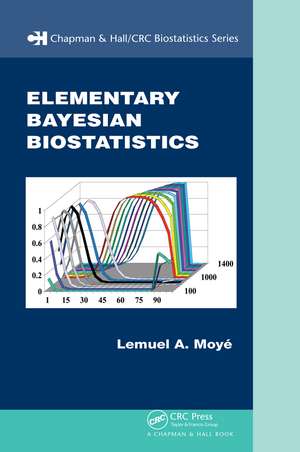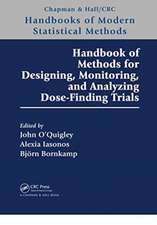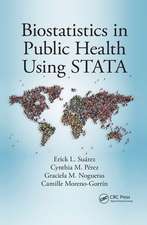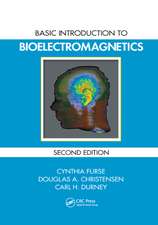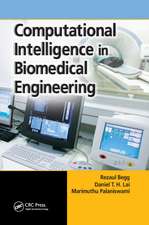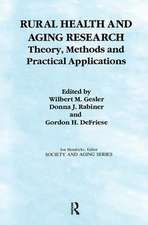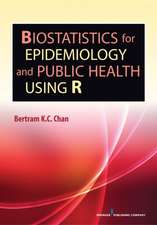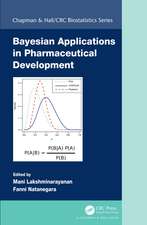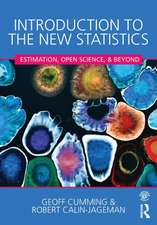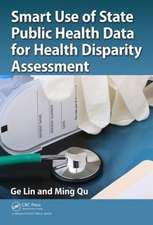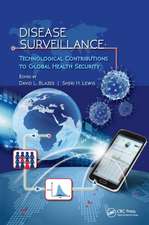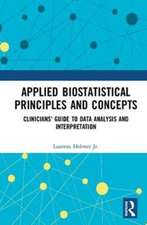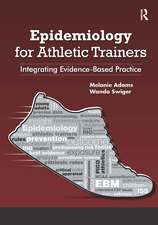Elementary Bayesian Biostatistics: Chapman & Hall/CRC Biostatistics Series
Autor Lemuel A. Moyéen Limba Engleză Paperback – 18 oct 2019
Building on the basics of classic biostatistics and algebra, this easy-to-read book provides a clear overview of the subject. It focuses on the history and mathematical foundation of Bayesian procedures, before discussing their implementation in healthcare research from first principles. The author also elaborates on the current controversies between Bayesian and frequentist biostatisticians. The book concludes with recommendations for Bayesians to improve their standing in the clinical trials community. Calculus derivations are relegated to the appendices so as not to overly complicate the main text.
As Bayesian methods gain more acceptance in healthcare, it is necessary for clinical scientists to understand Bayesian principles. Applying Bayesian analyses to modern healthcare research issues, this lucid introduction helps readers make the correct choices in the development of clinical research programs.
Din seria Chapman & Hall/CRC Biostatistics Series
-
 Preț: 386.62 lei
Preț: 386.62 lei -
 Preț: 355.91 lei
Preț: 355.91 lei - 8%
 Preț: 531.50 lei
Preț: 531.50 lei -
 Preț: 341.42 lei
Preț: 341.42 lei -
 Preț: 356.63 lei
Preț: 356.63 lei -
 Preț: 362.08 lei
Preț: 362.08 lei - 5%
 Preț: 656.94 lei
Preț: 656.94 lei - 9%
 Preț: 766.27 lei
Preț: 766.27 lei -
 Preț: 342.89 lei
Preț: 342.89 lei -
 Preț: 312.36 lei
Preț: 312.36 lei - 9%
 Preț: 594.78 lei
Preț: 594.78 lei - 9%
 Preț: 608.32 lei
Preț: 608.32 lei -
 Preț: 356.63 lei
Preț: 356.63 lei -
 Preț: 354.77 lei
Preț: 354.77 lei - 8%
 Preț: 376.64 lei
Preț: 376.64 lei -
 Preț: 372.30 lei
Preț: 372.30 lei - 8%
 Preț: 432.15 lei
Preț: 432.15 lei - 9%
 Preț: 683.11 lei
Preț: 683.11 lei - 9%
 Preț: 682.93 lei
Preț: 682.93 lei -
 Preț: 288.80 lei
Preț: 288.80 lei - 9%
 Preț: 681.82 lei
Preț: 681.82 lei -
 Preț: 311.47 lei
Preț: 311.47 lei -
 Preț: 362.00 lei
Preț: 362.00 lei -
 Preț: 378.11 lei
Preț: 378.11 lei - 9%
 Preț: 833.28 lei
Preț: 833.28 lei - 5%
 Preț: 338.17 lei
Preț: 338.17 lei - 9%
 Preț: 940.38 lei
Preț: 940.38 lei - 18%
 Preț: 791.14 lei
Preț: 791.14 lei - 18%
 Preț: 702.37 lei
Preț: 702.37 lei - 18%
 Preț: 1730.31 lei
Preț: 1730.31 lei - 28%
 Preț: 875.16 lei
Preț: 875.16 lei - 18%
 Preț: 786.89 lei
Preț: 786.89 lei - 25%
 Preț: 825.63 lei
Preț: 825.63 lei - 15%
 Preț: 678.14 lei
Preț: 678.14 lei - 25%
 Preț: 557.58 lei
Preț: 557.58 lei - 29%
 Preț: 625.83 lei
Preț: 625.83 lei - 18%
 Preț: 786.38 lei
Preț: 786.38 lei - 25%
 Preț: 778.07 lei
Preț: 778.07 lei - 25%
 Preț: 628.29 lei
Preț: 628.29 lei - 18%
 Preț: 1124.97 lei
Preț: 1124.97 lei - 28%
 Preț: 881.75 lei
Preț: 881.75 lei - 25%
 Preț: 526.81 lei
Preț: 526.81 lei - 30%
 Preț: 560.37 lei
Preț: 560.37 lei - 15%
 Preț: 479.86 lei
Preț: 479.86 lei - 18%
 Preț: 1017.63 lei
Preț: 1017.63 lei - 18%
 Preț: 1115.51 lei
Preț: 1115.51 lei
Preț: 376.17 lei
Preț vechi: 503.23 lei
-25% Nou
Puncte Express: 564
Preț estimativ în valută:
71.98€ • 75.34$ • 59.91£
71.98€ • 75.34$ • 59.91£
Carte tipărită la comandă
Livrare economică 31 martie-14 aprilie
Preluare comenzi: 021 569.72.76
Specificații
ISBN-13: 9780367388799
ISBN-10: 0367388790
Pagini: 400
Ilustrații: 123
Dimensiuni: 156 x 234 mm
Greutate: 0.77 kg
Ediția:1
Editura: CRC Press
Colecția Chapman and Hall/CRC
Seria Chapman & Hall/CRC Biostatistics Series
Locul publicării:Boca Raton, United States
ISBN-10: 0367388790
Pagini: 400
Ilustrații: 123
Dimensiuni: 156 x 234 mm
Greutate: 0.77 kg
Ediția:1
Editura: CRC Press
Colecția Chapman and Hall/CRC
Seria Chapman & Hall/CRC Biostatistics Series
Locul publicării:Boca Raton, United States
Public țintă
UndergraduateCuprins
Preface. Introduction. Prologue. Basic Probability and Bayes Theorem. Compounding and the Law of Total Probability. Intermediate Compounding and Prior Distributions. Completing Your First Bayesian Computations. When Worlds Collide. Developing Prior Probability. Using Posterior Distributions: Loss and Risk. Putting It All Together. Bayesian Sample Size. Predictive Power and Adaptive Procedures. Is My Problem a Bayes Problem? Conclusions and Commentary. Appendices. Index.
Recenzii
"This is a fun book for teaching oneself (or others) both some fundamental principles of epidemiology and clinical trials and fundamental principles of probability and statistical inference from the point of view of a practising clinical scientist who is also a very knowledgeable, no-nonsense Bayesian. What makes it very different from common textbooks is its blending of history, controversy (about probability, statistics, and clinical studies), real-life examples, and wise practical advice. … a very readable introduction to basic probability models, inference questions, and Bayesian answers without calculus and Markov chain Monte Carlo. …"
—International Statistical Review, 2008
". . . provides a very clear exposition of Bayesian thinking for applications in biostatistics. The book’s strengths lie in its careful discussions of Bayesian thinking or problems in health care research, including the constructions of priors and loss functions . . . a welcome addition to the growing number of books that describe Bayesian modeling from an applied perspective."
–Jim Albert, Bowling Green State University, in JASA, December 2008
—International Statistical Review, 2008
". . . provides a very clear exposition of Bayesian thinking for applications in biostatistics. The book’s strengths lie in its careful discussions of Bayesian thinking or problems in health care research, including the constructions of priors and loss functions . . . a welcome addition to the growing number of books that describe Bayesian modeling from an applied perspective."
–Jim Albert, Bowling Green State University, in JASA, December 2008
Descriere
With numerous exercises and a CD-ROM of data sets and computing code, this lucid introduction explores Bayesian principles and illustrates their application to healthcare research. It reviews the interesting and controversial history of the Bayesian concept and enables a balanced comparison of Bayesian tools with standard frequentist approaches. The book also discusses several important implementations of Bayesian procedures in clinical research, including sample size computations, adaptive randomization, and monitoring procedures. In addition, it shows how to evaluate a healthcare research scenario to determine whether a frequentist or Bayesian approach is most appropriate.
